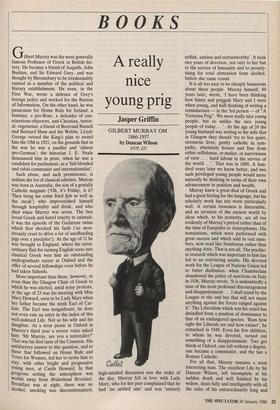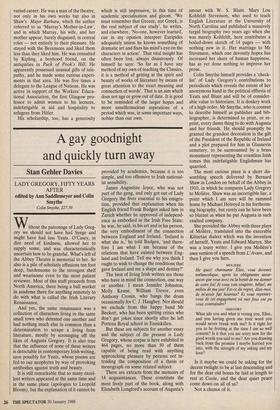BOOKS
A really nice young prig
Jasper Griffin
GILBERT MURRAY OM 1866-1957 by Duncan Wilson
OUP, f25
Gilbert Murray was the most generally famous Professor of Greek in British his- tory. He became a friend of Asquith, John Buchan, and Sir Edward Grey, and was thought by Bloomsbury to be irredeemably tainted as a member of the political and literary establishment. He even, in the First War, wrote a defence of Grey's foreign policy and worked for the Bureau of Information. On the other hand, he was passionate for Home Rule for Ireland, a feminist, a pro-Boer, a defender of con- scientious objectors, anti-Christian, teetot- al, vegetarian; a friend of Bertrand Russell and Bernard Shaw and the Webbs. Lloyd- George vetoed the King's plan to award him the OM in 1921, on the grounds that in the war he was a pacifist and 'almost pro-German'; the historian J. E. Neale denounced him in print, when he was a candidate for parliament, as a lull-blooded and rabid communist and internationalist'.
Such abuse, and such prominence, is seldom the lot of classical scholars. Murray was born in Australia, the son of a genially Catholic magnate ('Oh, it's Friday, is it? Then bring me some fried #sh as well as the steak') who impoverished himself through hospitality and drink, and who died when Murray was seven. The boy loved Greek and hated cruelty to animals: it was the episode of the Gadarene swine which first shocked his faith ('so mon- strously cruel to drive a lot of unoffending pigs over a precipice'). At the age of 11 he was brought to England, where his extra- ordinary flair for turning English verse into classical Greek won him an outstanding undergraduate career at Oxford and the offer of several fellowships even before he had taken Schools.
More important than these, however, or even than the Glasgow Chair of Greek to which he was elected, amid noisy protests, at the age of 23 was his meeting with Miss Mary Howard, soon to be Lady Mary when her father became the ninth Earl of Car- hsle. The Earl was insignificant; he does not even rate an entry in the index of this well-indexed Life. Not so his wife and his daughter. At a river picnic in Oxford in Murray's third year a severe voice asked /um: 'Mr Murray, are you a teetotaller?' That was his first taste of the Countess. His satisfactory answer to this question, and to those that followed on Home Rule and Votes for Women, led her to invite him to stay, with other bright and progressive Young men, at Castle Howard. In that gorgeous setting the atmosphere was worlds away from Brideshead Revisited. Breakfast was at eight, there was no alcohol, smoking was discountenanced, high-minded discussion was the order of the day. Murray fell in love with Lady Mary, who for her part complained that he had 'no settled aim' and was 'entirely selfish, aimless and untrustworthy'. It took two years of devotion, not only to her but to the service of humanity and to prosely- tising for total abstention from alcohol, before she came round.
It is all too easy to be cheaply humorous about these people. Murray himself, 60 years later, wrote, 'I have been thinking how funny and priggish Mary and I were when young, and half thinking of writing a reminiscence — in the 3rd person — of "A Victorian Prig". We were really nice young people, but so unlike the nice young people of today. . .'. At the age of 24 the young husband was writing to his wife that in Glasgow they should 'try to live quiet, strenuous lives, gently catholic in sym- pathy, absolutely honest and free from either selfishness, or malice, or narrowness of view . . . hard labour in the service of the world. . .'. That was in 1890. A hun- dred years later we know better, and two such privileged young people would more naturally be thinking in terms of their own advancement in position and wealth.
Murray knew a great deal of Greek and had a great feeling for the language, but his scholarly work has not worn particularly well. A certain looseness is discernible, and an invasion of the ancient world by ideas which, to his posterity, are all too evidently of Murray's period rather than of the time of Euripides or Aristophanes. His translations, which were performed with great success and which sold in vast num- bers, now read like Swinburne rather than anything Attic. That is not all. The psychic- al research which was important to him has led to no convincing results. His devoted work for the League of Nations Union led to bitter disillusion: when Chamberlain abandoned the policy of sanctions on Italy in 1936, Murray wrote, 'It is undoubtedly a time of the most profound discouragement and disappointment. . . I shall stand by the League to the end but that will not mean anything against the forces ranged against it': The Liberalism which was his creed has dwindled from a position of dominance to that of an endangered species: 'Rum how right the Liberals are and how extinct', he remarked in 1949. Even his five children, to whom he was devoted, turned out something of a disappointment. Two got thirds at Oxford, one left without a degree, one became a communist, and the last a Roman Catholic.
For all that, Murray remains a most interesting man. The excellent Life by Sir Duncan Wilson, left incomplete at his sudden death and well finished by his widow, deals fully and intelligently with all the sides of his extraordinarily long and varied career. He was a man of the theatre, not only in his own works but also in Shaw's Major Barbara, which the author referred to as 'Murray's Mother-in-Law', and in which Murray, his wife, and her mother appear, barely disguised, in central roles — not entirely to their pleasure. He stayed with the Berensons and liked them less than they liked him. He was consulted by Kipling, a boyhood friend, on the antiquities in Puck of Pook's Hill. He apparently possessed unusual gifts of tele- pathy, and he made some curious experi- ments in that area. He was five times a delegate to the League of Nations. He was active in support of the Workers' Educa- tional Association, the first Glasgow pro- fessor to admit women to his lectures, indefatigable in aid and hospitality to refugees from Hitler.
His scholarship, too, has a generosity which is still impressive, in this time of academic specialisation and gloom. 'We must remember that Greece, not Greek, is the real subject of our study', he writes, and elsewhere, `No-one, however learned, can in my opinion interpret Euripides adequately unless he knows something of dramatic art and fixes his mind's eye on the characters in action'. That vital insight has often been lost, always disastrously. Of himself he says: 'So far as I have any method of my own of teaching the Classics, it is a method of getting at the spirit and beauty of works of literature by means of great attention to the exact meaning and connection of words'. That is an aim which does not age or grow out of date. It is good to be reminded of the larger hopes and more unselfconscious aspirations of a period which was, in some important ways, nobler than our own.



















































 Previous page
Previous page